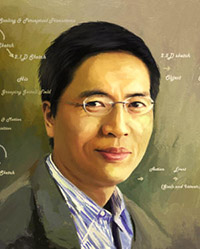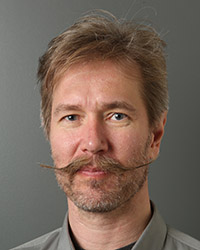Monday, September 18 Michael Elad Sparse Modeling in Image Processing and Deep Learning |
|
|
Michael Elad holds a B.Sc. (1986), M.Sc. (1988) and D.Sc. (1997) in Electrical engineering from the Technion, Israel Institute of Technology. After several years in industrial research, Michael served as a research associate at Stanford University during 2001-2003, working closely with Prof. Gene Golub (CS), Prof. Peyman Milanfar (EE-UCSC), and Prof. David L. Donoho (Statistics). Since 2003 he holds a permanent faculty position in the Computer Science Department at the Technion. Michael works in the field of signal and image processing, specializing in particular on inverse problems and sparse representations. He has authored hundreds of technical publications in leading venues, many of which have led to exceptional impact. He is the author of the 2010's book "Sparse and Redundant Representations: From Theory to Applications in Signal and Image Processing", which is a leading publication in this field. He has served as an Associate Editor for IEEE-TIP (2007-2011), IEEE-TIT (2011-2014), ACHA (2012-2015), and SIAM Imaging Sciences - SIIMS (2010-2015). He held a senior editorial role for IEEE-SPL (2012-2014), and since January 2016, he is serving as the Editor-in-Chief for SIIMS. Michael received numerous teaching and research awards and grants. He was awarded an ERC advanced grant in 2013. He is the recipient of the 2008 and 2015 Henri Taub Prizes for academic excellence, and the 2010 Hershel-Rich prize for innovation. Michael is an IEEE Fellow since 2012. |
Tuesday, September 19 Song-Chun Zhu |
|

|
Song-Chun Zhu received a Ph.D. degree from Harvard University in 1996. He is Professor of Statistics and Computer Science at UCLA, and Director of the UCLA Center for Vision, Learning, Cognition and Autonomy (VCLA@UCLA). His work in computer vision received a number of honors, including the Marr Prize in 2003 for image parsing with Tu et al, the Marr Prize honorary nominations in 1999 for texture modeling and in 2007 for object modeling with Y. Wu et al. He received the Aggarwal prize from the International Association of Pattern Recognition in 2008 for “contributions to a unified foundation for visual pattern conceptualization, modeling, learning, and inference”. He received the Helmholtz Test-of-time prize at ICCV 2013. As a junior faculty he received the Sloan Fellow in Computer Science, NSF Career Award, and ONR Young Investigator Award in 2001. He is a Fellow of the IEEE since 2011. In recent years, he is also interested in situated dialogues and cognitive robots with the support of some DARPA projects. He is the Principal Investigator leading two consecutive ONR MURI projects on Scene/Event Understanding and Commonsense Reasoning, respectively. He serves the IEEE community as a General Chair for CVPR 2012 and 2019. |
Wednesday, September 20 Kari Pulli Immersive Optical-See-Through Augmented Reality |
|

|
Kari Pulli is CTO at Meta. Before joining Meta, Kari worked as CTO of the Imaging and Camera Technologies Group at Intel influencing the architecture of future IPUs. He was VP of Computational Imaging at Light and before that he led research teams at NVIDIA Research (Senior Director) and at Nokia Research (Nokia Fellow) on Computational Photography, Computer Vision, and Augmented Reality. He headed Nokia's graphics technology, and contributed to many Khronos and JCP mobile graphics and media standards, and wrote a book on mobile 3D graphics. Kari holds CS degrees from University of Minnesota (BSc), University of Oulu (MSc, Lic. Tech.), University of Washington (PhD); and an MBA from University of Oulu. He has taught and worked as a researcher at Stanford University, University of Oulu, and MIT. |